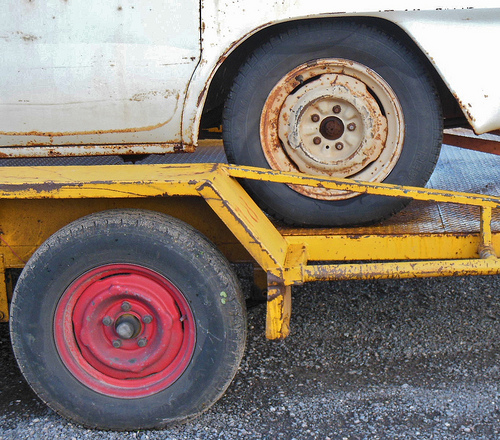How Long Will My Tires Last On My Car?

There is a lot of divided opinions on how long your tires will last on your vehicle. Even the National Highway Traffic Safety Administration (NHTSA) has no guideline on how long tires will last, and leaves the determination to the tire manufacturers. Some car manufacturers claim tires can last up to 6 years from their production date, while some tire makers claim they can last up to 10 years. But this does not take into account the many factors that go to determine how long or how safe a tire will be in real life.
The major factors which affect a tire are heat, storage and use: this varies for all of us so dramatically, that it is impossible to give a one-size fits all recommendation. We have to educate ourselves on our own driving habits, how we maintain our vehicles and make common sense judgments which err on the side of caution. Remember, your tires are the only contact with the ground your vehicle has, and it is this small area of rubber which determines how much control you have over your vehicle. Tires are probably the #1 safety determinant for your vehicle – if they are faulty or degraded, your risk of an accident is extremely high and lives are at risk!
The NHTSA conducted research into tires and unsurprisingly discovered that tires degrade faster in warmer climates. It is not simply heat that ages a tire faster though, it is also the combination of other environmental factors which accompany warmer temperatures, such as exposure to sunlight or salt, such as found on the coast or during winter when roads are treated. Generally, if you live in a warm coastal state, you need to change your tires more frequently to be safe.
This particularly applies to your spare, or to the tires you are thinking of putting on your vehicle when you change the old ones out. How a tire is stored determines how fast the rubber compounds within it will degrade – it is this which causes the most concern with tire safety, as rubber does deteriorate over time and loses its drivability and handling characteristics.
If your spare is mounted on the underside of your vehicle, then it will be exposed to the elements and to dirt from the road and environment. It is aging even though it is not being worn out by being used. If your spare tire is in the trunk, then it is baking when the weather is warm, and you know just how hot it can get in your vehicle when the AC is off – this ages your tire fast.
Even the tires which have been stored in a garage will age, and depending on where and how they are stored will determine how fast they degrade. Tires stored outside in the elements will age much faster than those stored in a climate-controlled environment. In addition, you should always check the production date of the tires you are being sold – older tires will give you less use and decrease the safety of your vehicle.
You may not think you can control the use of your tires, after all, they are simply mounted and spin. Not at all – you do control how they are used, such as making sure you fit the appropriate tire for your vehicle, and always ensure they are properly inflated within the manufacturer’s specifications. You also know and can visibly check to see if there is any physical damage to your tires, for instance, did you hit the curb? Also, you should ensure you get your tires rotated on a regular basis too. Finally, how often you driving and what are the road conditions like – weekend driving will age your tires differently from a regular daily commuter vehicle.
David Braddock is a car geek and writes on all things automobiles – he is currently working with HiLo Auto Sales of Frederick Maryland.
